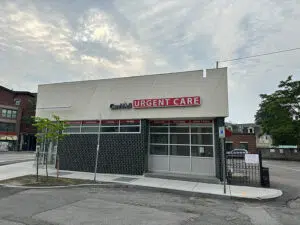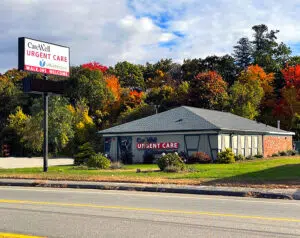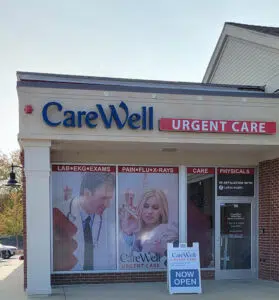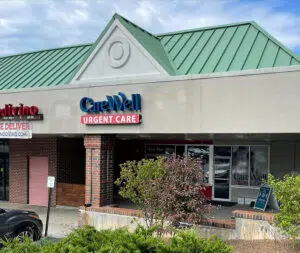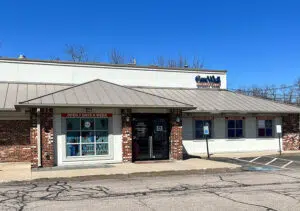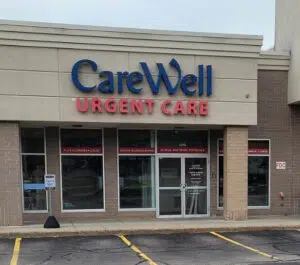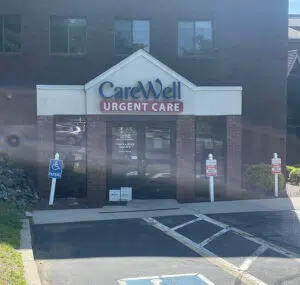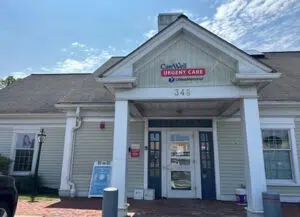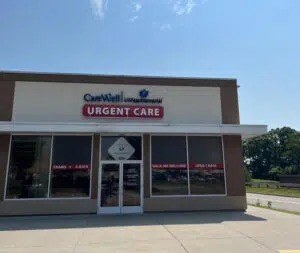
If you’re not fond of spiders, you’re not alone. As we head into the warmer months here in New England, insects are more active, and spiders are no exception. It’s important to know what to watch for if a spider has bitten you and when to seek medical help. Many spider bites are harmless, but some can be dangerous. At CareWell Urgent Care, our experienced providers can diagnose harmful spider bites and provide rapid care.
When to See a Provider for a Spider Bite
Bites from many common spiders are typically mild and can be cared for at home. Two types of spiders are more dangerous: black widow spiders and brown recluse spiders. These spiders carry harmful venom that is injected through the skin when they bite.
Black widow spiders are most common in the western and southern United States but can be found throughout North America. Black recluse spiders are black and can be identified by a red hourglass shape on their belly. Though brown recluse spiders are rare in the New England area, they can occur. These brown spiders can be identified by a violin shape on their back.
If you think you have been bitten by one of these dangerous spiders or are unsure, you should seek spider bite treatment at urgent care.
Spider Bite Symptoms
Visit urgent care for a spider bite if you experience any of the following symptoms, which may indicate that a venomous spider has bitten you:
- Fever.
- Chills.
- Sweating.
- Body aches.
- Fatigue.
- Nausea.
- Vomiting.
- Spreading of a reddened area.
- Red streaks around the bite.
- Worsening of the wound.
- Severe pain.
Spider bite symptoms like these may begin soon after a bite but may take several hours to appear.
Call 911 and get help in an emergency room if you experience more emergent spider bite symptoms:
- Abdominal pain.
- Cramping.
- Muscle spasms.
- Dark urine.
- Breathing problems.
- Swallowing difficulty.
- Seizures.
In contrast to the bites from a black widow or brown recluse, those from a harmless spider may cause a red, itchy, or painful bump that usually heals on its own.
Spider Bite Treatment in Urgent Care
When you visit CareWell Urgent Care for a spider bite, our experienced clinicians will work to diagnose your spider bite, determine its severity, and choose the best treatment. A provider will clean your spider bite carefully to prevent infection.
You may be given medication to relieve symptoms. Medicines ordered by your provider may include an anti-inflammatory or a steroid for pain, fever, and swelling, an antihistamine for itching, or an antibiotic to help prevent infection. In some cases, a tetanus shot may be indicated.
If you experience emergent spider bite symptoms like breathing difficulty, fainting, or seizures, our staff will provide immediate care and arrange for transfer to an emergency room.
Complications of a Spider Bite
Bites from a black widow spider or brown recluse can be deadly in some cases, though this is rare. Young children are at higher risk, and it's advisable to seek pediatric urgent care promptly.
When they bite, black widow spiders inject a neurotoxic venom that produces significant pain at the site and often spreads to the abdomen, chest, or the whole body.
The venom injected by a brown recluse may cause tissue death (necrosis), resulting in a severe wound. These large wounds may take weeks or months to heal, and residual scarring is common.
Risk Factors for Spider Bites
Spiders like black widows and brown recluses may be found in warmer climates and dry, dark places.
Black widow spiders are active during the warmer months and most often live in:
- Woodpiles.
- Sheds.
- Garages.
- Fences.
- Eaves.
- Gardening equipment.
- Empty pots.
- Cabinets or closets in cooler weather.
Brown recluse spiders are also more active in warmer months. They may be found in:
- Basements.
- Attics.
- Empty cupboards.
- Bed linens.
- Clothing.
They prefer dark, dry spots outdoors, such as beneath rocks, under logs, or inside stumps.
At CareWell Urgent Care, we take pride in providing rapid, exceptional care. Our caring clinical staff focuses on you and your family, ensuring you receive top-notch treatment when you need it. If you need urgent care for bug bite treatment, visit one of our 12 Massachusetts and Rhode Island locations.


